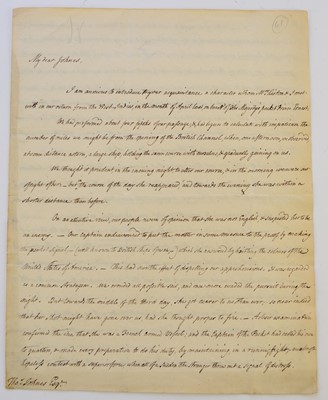Ending 20th Feb, 2024 16:00
Timed Militaria, Maritime and Naval Auction
Sir Robert Liston - ALS documenting a voyage being pursued by a suspicious vessel, 1801.
Sir Robert Liston GCB FRSE PC (8 October 1742 – 15 July 1836) Scottish diplomat and ambassador including to the United States, autograph letter signed, six pages over two folio sheets, Pall Mall, 31st March 1801, to Thomas Johnes MP.
A fascinating letter documenting an account of a voyage onboard H.M Packet 'Prince Ernest' and being pursued by a suspicious vessel flying the United States flag. Excerpts include:
"We observed at some distance astern a large ship holding the same course with ourselves and gradually gaining on us. We thought it prudent in the issuing night to alter our course and in the morning we we out of sight of her:- but in the course of the day she reappeared, and towards the evening she was in a shorter distance than before.
On an attentive view, our people were of opinion that she was not English and suspected her to be an enemy. Our Captain endeavoured to put the matter in measure to the proof, by making the packet signal, (well known to British ships of war) which she answered by hoisting the colours of the United States of America. This had not the effect of dispelling our apprehensions. It was regarded as a common stratagem. We crowded all possible sail, and once more evaded the pursuit during the night. But towards the middle of the third day, she got nearer to us than ever;- so near indeed that her shot might have gone over us had she thought proper to fire.- A closer examination confirmed the idea that she was a French armed vessel; and she Captain of the Packet had called his men to quarters, 7 made every preparation to do his duty, by maintaining, in a running fight ... and a hopeless contest with a superior force, when all of a sudden the stranger threw out a signal of distress.
A majority of our people now believed that she was actually an American, who had so long & so eagerly followed us, in the expectation of obtaining indispensable assistance, while some still harboured suspicions that she might be French & and the signal of distress a mere ruse de guerre:- for although this particular species of deceit could not be regarded as conformable to the usual practice or to the Law of Stations, yet certain Naval Officers, who happened to be on board, quoted an instance of a not less culpable fraud which occurred during the existence of the old French government; and it was added that it might naturally be employed by the Republicans of the present day. An application was made was however made to the Captain of the Packet, requesting that he would shorten sail, & make the stranger an offer of relief.
He urged that this was out of his power: that his orders were to speak no vessels whatsoever, not even our own ships of war; & that he was determined to adhere to his duty .... The signal of distress was kept flying and soon after observed people pumping very hard... One of the passengers, Mr Morell, asked to have the jolly boat with two seamen... this was agreed to... he would cause her to make an agreed signal if friendly... Morell was received on board... the signals received upon were made...
It was a ship belonging to New York, bound to Hamburg which had been struggling for eleven days against an adverse wind and was in want of provisions and water.. We spared her a part of our stores and after a very short delay proceeded on her voyage.."
The remainder of the letter includes an impassioned plea for Johnes to offer assistance to the saviour of the situation, Mr. Morrell. Morrell was a Lieutenant in the Navy and was on the eve of becoming First Lieutenant to the Commander in Chief of the Leeward Islands Station (Admiral Duckworth) before being struck down by a 'disease of the climate', which ultimately forced him out of the service to return home in the hopes of recovering.
Sold for £110





